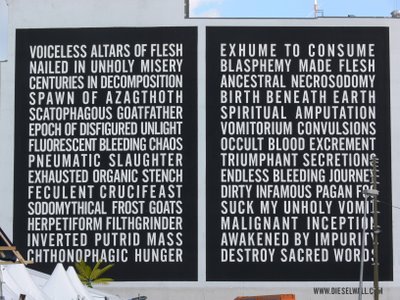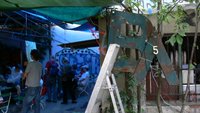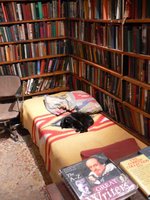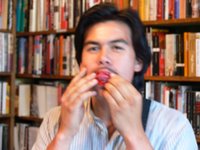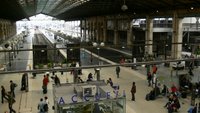6.22 - Nuremberg

5:30 on a Thursday morning. An alarm ringing, then another. The shower grabs me and provides some minimal waking. I put on my clothes.
Nick and I are meeting Paul and Katrina at the Hauptbanhof at 6:30 to catch a train from Berlin to Nuremberg. Dressed modestly in their Uncle Sam hats, patriotic t-shirts and flag-capes, Nick and Paul have tickets to see the U.S. play Ghana at 4 pm. Ticket-less, I have on a stars and stripes cowboy shirt, and Nick's American Spirit truckers hat, while Katrina, British, is without stripes, though she makes her best attempt at being supportive in a red shirt, blue stars painted onto her face.
The station's escalator-separated levels shine an immaculate silver in the still early light, as a respectable number of Americans gather around us on the platform. I buy a loaf of bread, drown it in Nutella, then rescue it with some mouth to mouth. Aboard the train I try to read, and sleep, and wonder whether, after Germany, I'll ever be able to bear riding on Amtrak again.
We arrive in Nuremberg around 11:00. Aesthetically, it's immediately recognizable as Bavarian - for its architecture, as well as the shape and adornment of its non-football-migrant natives: old women wander about wearing afro puffs; no self-conscious Berlinese styles to be seen.
As we're not meeting Rajah, the guy with whom we are staying (a student of history and dreadlocked reggae DJ, as well as Katrina's former Turkish roomate's best-friend's brother), until noon, we stumble around looking for food, and come upon a gathering of fans.
“We are sorry,
we are sorry,
we are sorry,
you will lose”
echoes the drum-accompanied Ghanain chant (loosely to the tune of 'Oh My Darlin' Clementine'). We begin to grow nostalgiac for once-simple dismissals of other people as less human or evil, for differences unexplained and unpsychologized, for the encompassing sense of stability and self-assurance which such dismissals afford; I smile and think of Morbo, the alien news anchor from Futurama. Morbo: "Hello little man. I WILL DESTROY YOU!" We smile at the Ghanains, wish them luck, and take a few pictures. May the best team win, etc, etc.
After dropping our stuff off in Rajah's room, which he's graciously letting us use for two nights while he crashes at his girlfriend's, he takes us to a grocery store to buy some beers and whiskey. We buy some beers and whiskey. Hopping onto the S-bahn beside a bunch of American fans and a few Mexicans, in short time we build a wall (only a football wall, though, you know, covering our testicles, it's not that we're pro-NAFTA or anything)
Getting off the train and walking down the platform, 'The Star Spangled Banner' , 'America the Beautiful' or some other such not-altogether-interesting anthemic tune mysteriously begins to emanate from our increasingly licquored-up procession. We swing our arms and bounce on the balls of our feet, bemoaning the many Germans dressed up in Ghanain gear: is this simply motivated by geopolitically understandable anti-Americanism or a deeper Germanic urge to exotify (especially in Berlin, the Germans seem to have an overwhelming fascination with all things Brazilian)?

We empty our bladders into the bushes, then separate. Nick and Paul head into the stadium, as Katrina and I move towards the fan mile. Trading swigs of whiskey and sharing it with any legitimate Ghanaian fans that we can find, we begin to come upon the scalpers. Having just finished reading 'Blood Meridian', I grow nervous and prepare for the worst
: large and mean, shifty eyed, with capitalisms dripping from their fangs. But for the most part they generally seem like nice people. Books and covers.
The first scalper's offering a 100E ticket for 120. I don't have the money, but Katrina does. She waffles and leans both ways. The alcohol pushes her. She buys the ticket. I take up the whiskey and head on alone, swigging without a partner. 100E on my person, owing money all over town, and with nothing momentarily in my bank account (some past due funds are shortly on the way, I hope) in a short-lived urge of patriotic fandom, contradictory to all my frugality and better sense, I become increasingly determined to see the game. The scalpers swarm. My hurriedly put-together sign, states quite simply: “I NEED TICKETS”.
Yet, after the one that Katrina found, no one seems willing to settle for anything lower than 150. And even if I
could justify spending an amount of money on which I could live for almost two weeks for a mere hour and one half of my viewing pleasure, frankly I just don't have it. Which is what I tell them. Which is when they leave.
Silly price fixers, don't they know this isn't how capitalism works? It's always that the market's all
free and such when you're controlling it. But I have time on my side, and the unbargainwithable aid of offering all I've got. I'll even throw in the rest of the whiskey. How can they argue with that?

Eventually, as the clock ticks toward game time, a Californian who's got his own ticket but is trying to sell off his wife's (the detective in me wants to know what he's done with the body), who I already offered my 100 to but like all the rest he was looking for 150, returns and accepts my price. Taking one final swig off the whiskey, I leave the rest behind with a kindly fellow beside whom I'd been sitting on the mile. Sprinting fervored toward the stadium, I find my seat just in time for the anthem, for which I stand. And even without my dad there to prod me, I take off my hat, cause it's not about politics now, it's about football. And I'm an American, God-damn it. And it's on, Ghana. It's on.
And then the Ghanains turn it on.
And then our Weltmeisterschaft is off.
And damn it Bruce Arena, why didn't you start Eddie Johnson?
 Austin, TX:
Austin, TX:



